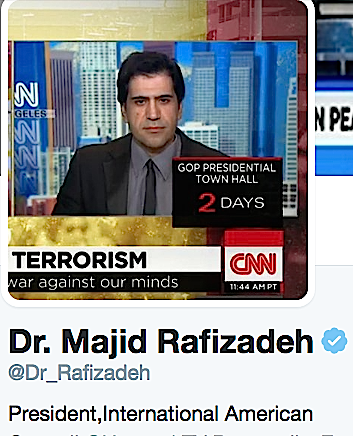I was born after the Islamic revolution 1979 in the city of Esfahan, Iran. Unlike many other Iranian-Americans, I lived, studied, and grew up most of life in Iran, including under the presidency of Mahmoud Ahmadinejad and leadership of the Supreme Leader Ali Khamenei. I believe that I gained on the ground, first-hand experience, and witnessed how the political establishment of Iran functions and how the Islamic Republic has its claws in every sector of the society.
It worth noting that one revolutionary value -- the anti-Americanism (death to the Great Satan) -- is the very existence, raison d'être, and legitimacy of the political establishment, particularly the top gilded circle of Iranian leaders. Whatever one attempts to do, whatever policy a government pursues, and whatever any U.S. administration attempts to do, one can not change this underlying ideological and revolutionary pillar of the system.
Why? Because If you take this revolutionary value (anti-Americanism) away from the Islamic Republic of Iran, the system will crumble like a house of sand.
That is why whenever leaders think that the U.S. and Iran are getting closer, Iranian top gilded leaders reassert the message that America is the enemy number one: The "Great Satan." Since the establishment of the Islamic Republic in 1979, Tehran's message has been consistent that the Islamic Republic faces existential threats and enemies. We were taught from an early age, through the educational system and books, about the dangerous "America." The state's media outlets persistently repeats why one should continue saying "death to America," and blames America for every socio-economic and geopolitical problem Iran has.
Having this powerful "enemy" serves very well as a social, political, strategic and economic scapegoat for Iranian leaders as well. Without "the Great Satan, the enemy" how can the Iranian leaders justify cracking down on opposition? Without the existential "the Great Satan, the enemy", how can Khamenei and the IRGC explain the large military budget? If there is no "the Great Satan, the enemy", how will Iranian leaders take attention away from the day-to-day difficulties that Iranians face? Without the "the Great Satan, the enemy", how can Iranian leaders distract attention from the accumulation of wealth at the top and the large amount of poverty in Iran? Without the "the Great Satan, the enemy", from which social base would Khamenei obtain his legitimacy? Having the powerful "Great Satan, the enemy" is also a method to rule by invoking nationalistic sentiments through instigating hatred and fear.
For more details and nuances you can read different versionfull on Here.
_______________________
Dr. Majid Rafizadeh is an American political scientist, business advisor, best-selling author, and the president of the International American Council on the Middle East. Harvard-educated, Rafizadeh serves on the advisory board of Harvard International Review. An American citizen, he is originally from Iran and Syria, lived most of his life in Iran and Syria till recently. He is a board member of several significant and influential international and governmental institutions, and he is native speaker of couple of languages including Arabic and Persian. He also speaks English and Dari, and can converse in French, Hebrew.
You can sign up for Dr. Rafizadeh's newsletter for the latest news and analyses on HERE. You can also order his books on HERE.
You can learn more about Dr. Rafizadeh on HERE.
You can contact him at Dr.rafizadeh@post.harvard.edu or follow him at @Dr_Rafizadeh.

